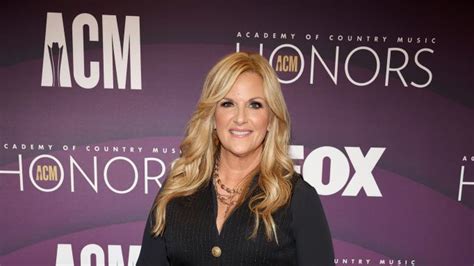
Trisha Yearwood is earning accolades from fans after publicly clarifying her stance on inclusivity and acceptance during a recent interview, emphasizing her support for the LGBTQ+ community and denouncing exclusion in any form.
Country music star Trisha Yearwood has garnered widespread praise from fans for her recent outspokenness regarding inclusivity and acceptance. In an interview published recently, Yearwood made her political stance unequivocally clear, asserting her belief that everyone deserves a place at the table and firmly denouncing any form of exclusion. Her comments, widely interpreted as a strong message of support for the LGBTQ+ community, have resonated deeply with many, prompting an outpouring of positive reactions across social media platforms.
Yearwood’s remarks, while not explicitly tied to any specific political issue, come at a time of heightened social and political polarization in the United States. The country music industry, in particular, has often been viewed as a traditionally conservative space, making Yearwood’s forthrightness all the more notable.
“It’s very simple: If you’re not invited to sit at the table, build your own table,” Yearwood stated. “We’re all different. That’s what makes the world go ’round.” Her message, emphasizing the importance of creating inclusive spaces for everyone regardless of their background or identity, has struck a chord with many who feel marginalized or underrepresented. The statement reflects a broader societal shift towards greater awareness and acceptance of diversity, equity, and inclusion (DEI).
The positive response to Yearwood’s comments underscores the growing demand for artists and public figures to take a stand on social issues. Many fans expressed their appreciation for her willingness to use her platform to promote values of acceptance and equality. Some fans have described feeling validated and empowered by her words, particularly those who identify as LGBTQ+ or come from other marginalized communities.
Yearwood’s career has spanned decades, establishing her as a prominent figure in country music. She has released numerous albums, won multiple awards, and built a loyal fan base through her powerful vocals and relatable lyrics. Her willingness to speak out on social issues may broaden her appeal to a new generation of listeners who prioritize artists who align with their values. This stance could also solidify her position among existing fans who appreciate her authenticity and courage.
However, taking a public stance on potentially divisive issues can also carry risks. Some artists have faced backlash or boycotts for expressing views that conflict with certain segments of their audience. It remains to be seen whether Yearwood’s comments will generate any significant negative reactions. As of now, the overwhelming response has been positive.
The interview, in which Yearwood made her statements, covered a range of topics, including her music career, her relationship with husband Garth Brooks, and her philanthropic endeavors. However, it was her remarks on inclusivity that quickly gained traction online, sparking conversations about the role of artists in advocating for social change.
Yearwood’s message is particularly relevant in the context of ongoing debates about LGBTQ+ rights and inclusion. In recent years, there have been numerous legislative efforts across the United States to restrict the rights of transgender individuals, limit discussions of LGBTQ+ issues in schools, and challenge same-sex marriage. Yearwood’s clear statement of support sends a powerful message to the LGBTQ+ community, indicating that they are valued and respected.
Furthermore, her comments highlight the importance of allyship. Allyship involves individuals from dominant groups using their privilege and influence to advocate for marginalized groups. By publicly supporting inclusivity and acceptance, Yearwood is demonstrating allyship and encouraging others to do the same.
The positive reception to Yearwood’s stance reflects a growing trend of consumers and fans supporting brands and artists that align with their values. This trend, often referred to as “conscious consumerism,” suggests that individuals are increasingly making purchasing decisions based on a company’s or artist’s social and environmental impact. By speaking out on issues she cares about, Yearwood may be strengthening her connection with fans who share her values.
In addition to her music career, Yearwood is also known for her successful cooking show and cookbooks. Her brand extends beyond music, encompassing food, lifestyle, and home decor. This diverse portfolio gives her a broader platform to reach audiences and influence opinions. Her stance on inclusivity may further enhance her brand image, positioning her as a role model and advocate for positive social change.
While Yearwood’s comments are receiving widespread praise, it is important to recognize that differing opinions exist. Some individuals may disagree with her views on inclusivity or believe that artists should refrain from expressing political opinions. However, the overwhelmingly positive response suggests that her message is resonating with a significant portion of her fan base and the broader public.
Ultimately, Trisha Yearwood’s decision to speak out on inclusivity reflects a growing trend of artists and public figures using their platforms to advocate for social change. Her message of acceptance and equality has been met with widespread praise, underscoring the importance of allyship and the growing demand for artists to align with their values. Whether her comments will have a lasting impact remains to be seen, but they have undoubtedly sparked important conversations and reinforced the importance of creating inclusive spaces for everyone.
Yearwood’s statement also brings to light the complex relationship between artists and their audiences. While some fans may prefer artists to remain neutral on social issues, others actively seek out artists who share their values and are willing to use their platforms to advocate for change. Yearwood’s decision to speak out suggests that she believes her voice can make a difference and that her fans will support her stance.
The long-term effects of Yearwood’s comments on her career and brand are uncertain. However, the initial response suggests that her decision to speak out will likely strengthen her connection with her existing fans and attract new listeners who appreciate her authenticity and commitment to inclusivity. In a world where social and political issues are increasingly intertwined with culture and entertainment, artists like Trisha Yearwood are playing an increasingly important role in shaping public discourse and promoting positive social change.
Yearwood’s message also reverberates within the context of the evolving landscape of country music. Historically, the genre has been perceived as resistant to change and slow to embrace diversity. However, in recent years, there has been a growing movement within the country music industry to promote inclusivity and representation. Artists like Lil Nas X, Mickey Guyton, and T.J. Osborne have challenged traditional norms and paved the way for greater diversity in the genre. Yearwood’s support for inclusivity aligns with this movement and reinforces the idea that country music can be a welcoming and inclusive space for all.
The impact of Yearwood’s comments extends beyond the realm of entertainment. Her message has the potential to influence broader societal attitudes and promote greater understanding and acceptance of diversity. By using her platform to advocate for inclusivity, she is contributing to a more inclusive and equitable society.
Furthermore, Yearwood’s comments highlight the importance of ongoing dialogue and engagement on social issues. While her statement is a positive step, it is just one part of a larger conversation about inclusivity and acceptance. It is crucial for individuals and organizations to continue to engage in meaningful dialogue and take concrete actions to promote diversity, equity, and inclusion in all aspects of society.
In addition to her remarks on inclusivity, Yearwood has also been involved in various philanthropic endeavors, demonstrating her commitment to giving back to her community. She has supported organizations that provide food assistance, disaster relief, and educational opportunities. Her philanthropic work aligns with her message of inclusivity and reinforces her image as a caring and compassionate individual.
Yearwood’s stance on inclusivity also resonates with younger generations who are increasingly prioritizing social responsibility and ethical behavior. These generations are more likely to support brands and artists that align with their values and are willing to take a stand on important social issues. By speaking out on inclusivity, Yearwood is potentially appealing to a younger audience and solidifying her relevance in a rapidly changing cultural landscape.
While Yearwood’s comments have been widely praised, it is important to acknowledge that some individuals may disagree with her views. It is essential to foster an environment of respectful dialogue where differing opinions can be expressed without fear of judgment or reprisal. However, it is also important to recognize that certain viewpoints may be harmful or discriminatory and should be challenged.
Yearwood’s message of inclusivity is particularly relevant in the context of rising hate crimes and discrimination against marginalized groups. By speaking out against exclusion and promoting acceptance, she is sending a message of hope and solidarity to those who are targeted by hate and discrimination. Her words can provide comfort and encouragement to individuals who may feel isolated or alone.
In conclusion, Trisha Yearwood’s decision to publicly clarify her stance on inclusivity and acceptance has been met with widespread praise, underscoring the growing demand for artists and public figures to take a stand on social issues. Her message of equality and allyship has resonated deeply with many, highlighting the importance of creating inclusive spaces for everyone. While the long-term effects of her comments on her career and brand are uncertain, the initial response suggests that her decision to speak out will likely strengthen her connection with her fans and attract new listeners who appreciate her authenticity and commitment to positive social change. Her willingness to use her platform to advocate for inclusivity reflects a growing trend of artists and public figures using their influence to promote a more just and equitable society. The conversation around her statement is a reminder that ongoing dialogue and engagement on social issues are crucial for fostering a more inclusive and accepting world. Her actions, coupled with her philanthropic efforts, cement her position as not only a celebrated entertainer but also a compassionate and engaged citizen.
The overwhelmingly positive response to Yearwood’s stance demonstrates a shift in public expectations for celebrities and public figures. No longer is it sufficient to simply entertain; many now expect those in positions of influence to use their platforms to advocate for positive social change and to take a stand on issues of importance. Yearwood’s actions align with this evolving landscape and position her as a role model for other artists who may be considering speaking out on social issues. Her deliberate and clear message offers a template for navigating potentially divisive topics with grace and conviction.
The effect of Yearwood’s pronouncements could extend beyond her immediate fanbase. By amplifying the conversation around inclusivity, she contributes to a broader cultural shift toward greater acceptance and understanding. This ripple effect can be especially potent within communities where LGBTQ+ individuals may feel marginalized or unheard. The impact of her vocal support, while difficult to quantify, cannot be dismissed.
Beyond the immediate reactions and implications, Yearwood’s stance invites a deeper reflection on the role of art and entertainment in shaping social norms and values. Throughout history, artists have used their creative expressions to challenge the status quo, inspire social change, and offer new perspectives on complex issues. Yearwood’s actions fall within this tradition, demonstrating the power of art to not only entertain but also to educate and empower. Her actions are a testament to the enduring influence of artists in shaping the cultural narrative.
Yearwood’s choice to make her views known could also inspire other country music artists, who have historically been hesitant to address political or social issues, to speak out. Her positive reception could serve as an example, showing that taking a stand on important matters can be both rewarding and beneficial. The landscape of country music could be significantly altered if more artists follow Yearwood’s lead, resulting in a more diverse and inclusive genre that reflects the values of its audience.
In the longer term, Yearwood’s legacy may be defined not only by her musical achievements but also by her advocacy for inclusivity and social justice. Her willingness to use her platform to make a difference could inspire future generations of artists to use their voices to promote positive change. This lasting impact would cement her status as a true icon, not only in the world of entertainment but also in the fight for a more just and equitable society.
Finally, the dialogue surrounding Yearwood’s statement underscores the importance of ongoing conversations about diversity, equity, and inclusion in all sectors of society. While her comments are a positive step, they are just one part of a larger, ongoing effort to create a more inclusive and equitable world. This necessitates continuous reflection, learning, and action from individuals, organizations, and governments alike. It is a collective responsibility to ensure that everyone has the opportunity to thrive and reach their full potential.
Frequently Asked Questions (FAQs)
- What specifically did Trisha Yearwood say that sparked the positive reactions?
Trisha Yearwood stated, “It’s very simple: If you’re not invited to sit at the table, build your own table. We’re all different. That’s what makes the world go ’round.” This statement, emphasizing inclusivity and acceptance, resonated deeply with fans.
- Why is Trisha Yearwood’s statement considered “political”?
While not explicitly endorsing a political party or candidate, Yearwood’s statement addresses a social issue—inclusivity and acceptance—that is often debated in the political arena. Her support for the LGBTQ+ community and her denunciation of exclusion align with certain political stances and values.
- How has the country music industry generally responded to LGBTQ+ issues in the past?
Historically, the country music industry has been perceived as conservative and slow to embrace LGBTQ+ issues. However, there has been a growing movement towards greater inclusivity in recent years, with artists like Lil Nas X, Mickey Guyton, and T.J. Osborne breaking barriers and advocating for change.
- What are some potential risks for artists who take a public stand on social or political issues?
Artists who take a public stand on potentially divisive issues may face backlash or boycotts from segments of their audience who disagree with their views. They may also face criticism or negative media coverage. However, speaking out can also strengthen their connection with fans who share their values and attract new listeners.
- How might Trisha Yearwood’s stance on inclusivity affect her brand and career in the long term?
The long-term effects are uncertain, but the initial response suggests that her decision to speak out will likely strengthen her connection with existing fans and attract new listeners who appreciate her authenticity and commitment to inclusivity. It may also enhance her brand image, positioning her as a role model and advocate for positive social change.









